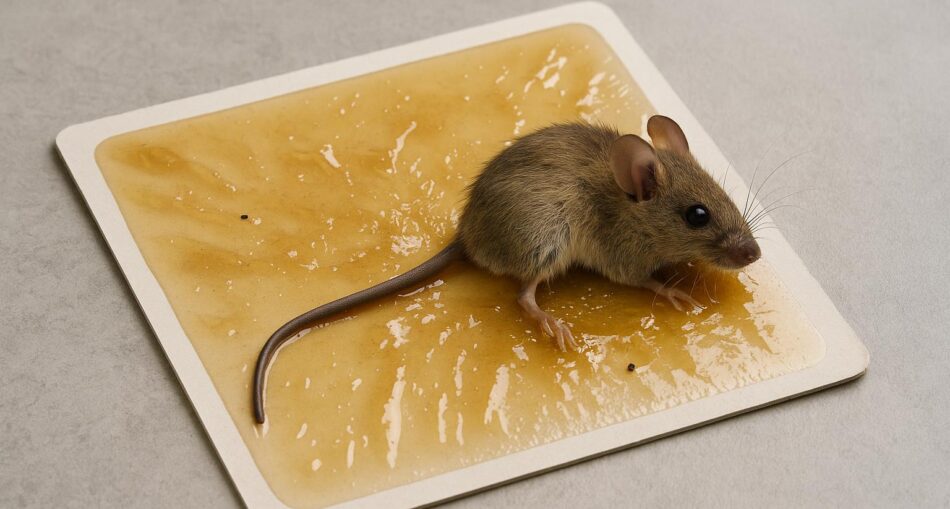What Are Glue Traps and How Do They Work?
The purpose of glue traps, which are flat boards coated with a powerful adhesive, is to capture insects, mice, and rats. Usually, they are positioned in nooks where pests congregate, beneath appliances, or along walls.
The idea is straightforward: the animal becomes immobile as soon as it touches the sticky surface. However, what follows is concerning. Animals in traps sometimes suffer for hours or even days before passing away from malnutrition, injury, or dehydration.
- Rodents caught may break bones or tear skin trying to escape
- Non-target species, including birds and lizards, can also become trapped
Many experts argue the traps do not ensure a quick or painless death, putting them in conflict with recognized humane standards.
Why Are Glue Traps Considered Inhumane by Many?
Glue traps are criticised mostly for not providing a quick and merciful execution. Rather, they increase the animal’s agony after capture. The British Pest Control Association claims that rodents may suffer for up to 24 hours after becoming caught on adhesive boards.
Several documented issues contribute to this concern:
- Trapped animals often chew off their limbs in desperation.
- Some suffocate when their faces get stuck.
- Others die from hypothermia or exhaustion.
According to the majority of international welfare criteria, these results are undesirable from an ethical standpoint. Because glue traps cause extended stress and suffering, the American Veterinary Medical Association (AVMA) states that they are not an authorised form of rodent death.
How Do Legal Systems View Glue Traps Globally?
Regulation of glue traps varies widely across countries. While some nations impose strict limitations or outright bans, others still allow widespread use.
|
Country |
Legal Status of Glue Traps | Enforcement Type |
| United Kingdom | Restricted to professional use |
Government guidelines |
|
New Zealand |
Available under limited circumstances | Ministry of Primary Industries oversight |
| Australia | Banned in several territories |
Regional legislation |
|
United States |
Legal but controversial |
State-by-state variation |
Only licenced pest control specialists may use glue traps in the UK due to the Glue Traps (Offences) Act 2022, which prohibits their sale and use in public. In other regions of Europe and Australia, similar limitations are becoming more prevalent.
In many places, glue traps are still lawful despite these changes. Customers can still purchase Mouse Glue Trap items from online merchants without any limitations or disclaimers on their humane use.
Are Glue Traps Effective for Pest Control?
Effectiveness often drives their popularity. Glue traps are:
- Cost-effective
- Easy to use without setup
- Able to catch multiple pests at once
Nevertheless, research indicates that glue traps are not always more successful than snap traps or electric traps. Additionally, they are not selective and frequently capture unwanted creatures. There are moral and environmental consequences to this.
Snap traps exhibited a 73% efficiency rate with low suffering. In contrast, glue traps matched that at 76% but had higher animal stress indicators, according to a comparative study conducted by Rodent Research International (2022).
Who Are the Non-Target Victims of Glue Traps?
One of the most overlooked concerns is the impact on non-target species. Glue traps don’t discriminate. Many reported cases involve:
- Small birds like wrens and sparrows
- Amphibians such as frogs and salamanders
- Pet hamsters and reptiles in domestic settings
Wildlife rehabilitators frequently receive cases where birds are brought in with ripped feathers and torn wings due to entanglement. Glue residues are extremely difficult to remove without harming the animal further.
What Do Veterinarians and Animal Welfare Groups Say?
The majority of significant animal rights organisations and veterinary associations are against the use of glue traps.
Glue traps are considered inhumane by the Royal Society for the Prevention of Cruelty to Animals (RSPCA), PETA, and the Humane Society International.
Any control strategy must reduce pain and suffering, according to the consensus. Modern veterinary research, which acknowledges rats as sentient creatures with the capacity for fear and sorrow, supports this idea.g.
“The measure of a society is how it treats its most vulnerable — even when they’re small and unwanted,” says Lisa Willmore, veterinary ethics specialist.
What Are Humane Alternatives to Glue Traps?
Several alternatives exist that aim to control pests without inflicting unnecessary suffering:
- Snap traps with quick-kill mechanisms – These kill instantly if used correctly.
- Electric traps – Deliver a fast, humane death with minimal mess.
- Live traps – Capture rodents for release far from residential zones.
Furthermore, a lot of pest control businesses now provide integrated pest management (IPM) techniques. These emphasise habitat change, isolation, and cleanliness as preventative measures.
|
Method |
Humaneness | Reusability | Cost Effectiveness |
| Snap Traps | High | Medium |
High |
|
Electric Traps |
Very High | High | Medium |
| Live Traps | Highest | Reusable |
Medium |
|
Glue Traps |
Very Low | Single-use |
High |
Why Do People Still Use Glue Traps?
Despite the clear ethical issues, glue traps persist due to:
- Lack of awareness about alternatives
- Immediate availability in retail outlets
- Inertia from traditional pest control methods
Many users are unaware that the suffering lasts hours or days. Visual effectiveness – seeing a captured pest – also plays into user preference, even if the method is cruel.
FAQs
- Do glue traps kill instantly?
No. Most animals die slowly over several hours or days due to dehydration or injury. - Are glue traps legal everywhere?
No. Many countries and states have banned or restricted their sale and use. - What should I do if I find an animal stuck on a glue trap?
Wear gloves, use vegetable oil to loosen the adhesive, and contact a wildlife rehabilitator immediately. - Can I release a mouse caught in a glue trap?
Technically yes, but survival chances are low due to stress and injuries. Humane alternatives are preferred. - Are electronic traps safer and more ethical?
Yes. Electric traps deliver quick, painless deaths and reduce human-animal conflict.






